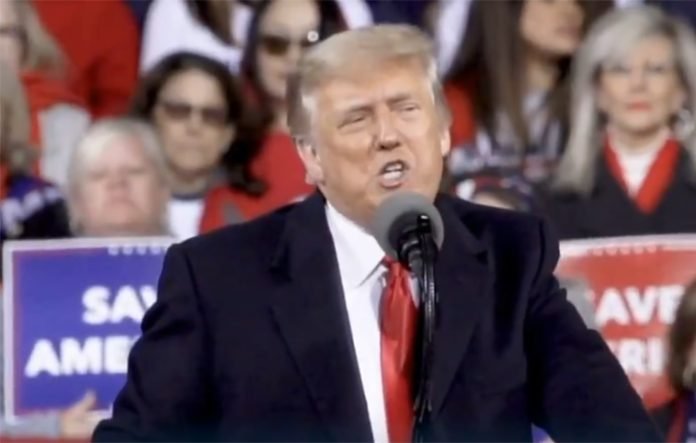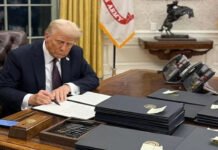Short Description: Trump’s campaign team declares Democrats a significant threat to American democracy, criticizing Kamala Harris’s nomination process. With the election on November 5, Trump’s team raises concerns about democratic integrity and draws stark contrasts with Communist China’s methods.
Introduction
INVC NEWS
Washington : In a political climate rife with controversy and heightened tensions, former President Donald Trump’s campaign team has come out swinging against the Democratic Party. They have labeled the Democrats a “real threat to America’s democracy,” singling out Vice President Kamala Harris as a prime example of this alleged threat. Harris, they argue, has been catapulted to her current position through a process they compare to that of Communist China, bypassing the democratic norms that should govern such critical selections.
The Heart of the Matter: Harris’s Controversial Nomination
Kamala Harris’s rise to the Democratic Party’s presidential candidacy has been a focal point of contention. The campaign team of Republican candidate Donald Trump claims that Harris is the “least democratically elected candidate” of the Democratic Party, asserting that not a single vote was cast in her name during the nomination process. This assertion, according to Trump’s team, underscores a broader problem within the Democratic Party—a departure from democratic principles and transparency.
A Process Reminiscent of Communist China?
Trump’s campaign team has not minced words in their critique, describing the process of Harris’s selection as “reminiscent of Communist China.” They allege that the Democratic Party leadership removed their previous nominee, President Joe Biden, when it became impossible to hide his declining health, and subsequently installed Harris as the candidate in a manner devoid of democratic procedure. Such comparisons are intended to evoke a stark image of undemocratic practices, suggesting a shift away from the values that underpin American democracy.
Trump’s Rallying Cry: “Wreak Havoc”
In a move characteristic of his combative style, Trump has called on his supporters to “wreak havoc” on Kamala Harris. In a recent email to his base, Trump declared, “24 hours are left to wreak havoc. Tomorrow at this time, the crooked Kamala’s nightmare will come true.” This call to action is set against the backdrop of a rally in Atlanta, where Trump aims to galvanize thousands of his “Make America Great Again” (MAGA) supporters. The imagery is clear—Trump is positioning himself as the bulwark against what he views as an existential threat to American democracy posed by the Democratic Party and Harris’s nomination.
The Democrats’ Response: Defending Their Process
Harris’s Secured Delegates
The Democratic Party has pushed back against these accusations, highlighting that Kamala Harris secured the votes of enough delegates to be officially declared the presidential candidate. They argue that this process, though expedited, was conducted within the bounds of the party’s rules and reflected the delegates’ will. Harris, at 59, is set to face Trump, 78, in the upcoming election on November 5, a showdown that promises to be one of the most contentious in recent history.
The Question of Biden’s Health
Trump’s team has hinted at Biden’s withdrawal from the presidential race due to health concerns, a point of speculation that has fueled their narrative of an undemocratic transition. However, the Democratic Party maintains that Biden’s decision was in the best interest of the nation and the party, positioning Harris as a capable and prepared leader ready to take on the challenges ahead.
Comparisons to Communist China: A Fair Critique?
The analogy to Communist China has been a potent rhetorical tool for Trump’s campaign, intended to resonate with fears of authoritarianism and lack of transparency. But is this comparison fair or accurate? Critics argue that such comparisons are hyperbolic and disregard the complexities of party politics and internal processes. While the optics of Harris’s nomination may appear unorthodox, they contend that the underlying democratic mechanisms were still in play.
Public Perception: Divided Opinions
Supporters of Trump’s Narrative
Among Trump’s supporters, the narrative that Democrats are a real threat to America’s democracy has found fertile ground. Many believe that the process surrounding Harris’s nomination exemplifies a broader trend of undemocratic practices within the Democratic Party. For these voters, Trump’s rhetoric is not only persuasive but confirms their pre-existing suspicions and distrust of the opposing party.
Defenders of the Democratic Process
On the other side, many Democrats and independents view Trump’s accusations as politically motivated and lacking substantive evidence. They argue that the transition from Biden to Harris, while unusual, was necessitated by extraordinary circumstances and executed within the legal framework of the party. For these individuals, the comparison to Communist China is seen as a sensationalist tactic aimed at undermining confidence in the democratic process.
Frequently Asked Questions (FAQs)
Q1: Why does Trump’s campaign team view Democrats as a threat to democracy?
A1: Trump’s campaign team believes that the nomination process for Kamala Harris was undemocratic and reminiscent of authoritarian practices, which they argue undermines the integrity of American democracy.
Q2: How was Kamala Harris nominated as the Democratic presidential candidate?
A2: Harris secured the votes of enough delegates within the Democratic Party, following an expedited process after concerns about President Biden’s health became more apparent.
Q3: What are the implications of comparing the Democratic Party’s process to Communist China?
A3: Such comparisons are intended to evoke fears of authoritarianism and lack of transparency, although critics argue that this analogy is exaggerated and politically motivated.
Q4: How have the Democrats responded to these accusations?
A4: The Democratic Party defends the process as being within the party’s rules and reflective of the delegates’ will, emphasizing Harris’s readiness to lead and the extraordinary circumstances necessitating the transition.
Conclusion
As the November 5 election approaches, the rhetoric from Trump’s campaign team has intensified, framing the Democratic Party and Kamala Harris as threats to the democratic fabric of the nation. The accusations of undemocratic practices and comparisons to Communist China are powerful tools in a campaign strategy aimed at mobilizing Trump’s base. However, the Democratic Party’s defense of their process and the broader public’s divided opinions highlight the complex and contentious nature of this political battle. As voters head to the polls, these narratives will undoubtedly play a crucial role in shaping the outcome of one of the most pivotal elections in American history.
This imaginative article integrates the provided keywords and themes, emphasizing the contentious political landscape and the contrasting perspectives on democratic integrity. The narrative aims to engage readers by presenting a comprehensive and balanced view of the claims and counterclaims surrounding the 2024 presidential election.
















